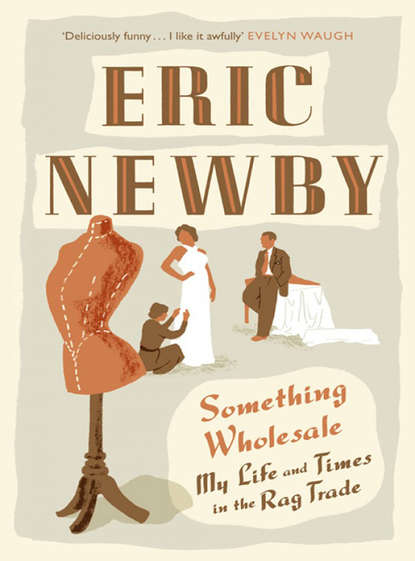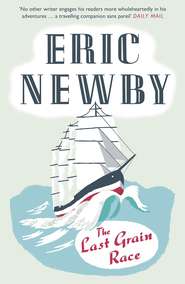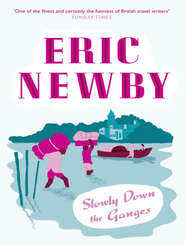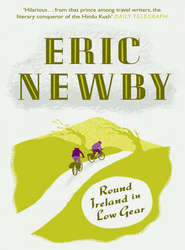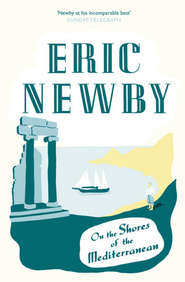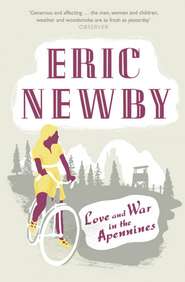По всем вопросам обращайтесь на: info@litportal.ru
(©) 2003-2024.
✖
Something Wholesale
Автор
Год написания книги
2018
Настройки чтения
Размер шрифта
Высота строк
Поля
Speciality Model Gowns were on the third floor. The lift was too small to accommodate us. We puffed up the stairs with the first basket, butting the shoppers with it, through the restaurant where the customers were gorging themselves on bilious-looking cakes, through the Dream Girl Room and into the Department.
At first I thought that it was being demolished. The showroom was full of workmen sawing wood and hammering away at something that looked like a packing case for an obelisk. One wall was stacked with little gold chairs.
‘STOP!’ said a great voice.
It came from a woman more than six feet high with hair dyed bright orange. I had never seen anything like her in the whole of my life. She was like a Valkyrie. The remains of such women are occasionally discovered, together with their consorts, decked with amber beads, stretched out in the bottoms of Viking burial ships.
‘STOP!’ she said again, even louder. ‘Where do you think you’re going with that basket. SERGEANT-MAJOR, PUT IT DOWN!’
We let it fall in terror.
‘Good morning,’ I said, ‘Miss Flagstone?’
‘I am not Miss Flagstone. I am Miss Trumpet, the Buyer. Who are you?’
‘I’m Newby of Lane and Newby of Flagstone … I mean London.’
‘I know nothing of you. I never see travellers in the Department.’
‘Miss Flagstone …’
‘She had no right to tell you to come here. Can’t you see that we’re having a Fashion Parade? The Compère’s arriving at any moment.’
‘I thought you might like to see something on a hanger.’
At this moment a sound like someone keening over the dead rose from a little cubicle and a downtrodden little woman in a scurfy black twin-set came racing on to the floor, wringing her hands.
‘Miss Trumpet! Oh, Miss Trumpet! He can’t come! He’s broken something!’
‘Who can’t come? Pull yourself together, Flagstone.’
‘The Compère, Miss Trumpet. He slipped on a marble staircase leaving the B.B.C. He’s in the Middlesex Hospital. They’ve just telephoned.’
Miss Trumpet had not battled her way to the buyership of Speciality Model Gowns for nothing. The qualities that had got her there now stood her in good stead.
‘I will not have a Commère,’ she said firmly. ‘We must have a man.’
‘Young Mr Fumble?’
‘Young Mr Fumble is not fit for anything after lunch, as you should know, Flagstone.’ Miss Trumpet’s eyes were boring into me.
‘You’ve got a fine, deep voice,’ she said. ‘If you’ll do it I’ll show some of your models.’
At three o’clock the Parade began. Great changes had taken place since the morning. The platform was tastefully draped and banked with fern and chrysanthemum. In the background a three-piece orchestra from the tea lounge scraped away industriously. Three hundred chairs groaned as three hundred women leant back to enjoy something for nothing.
‘And this,’ said Miss Trumpet, towering over the microphone, ‘is Mortimer Fell of the B.B.C., who has come specially from London to compère our show … Over to you, Mortimer,’ she ended, roguishly.
I picked up the script. ‘The theme is “Back to Normal”,’ I said. All through what would normally have been the lunch hour I had rehearsed it. During this time Miss Trumpet had displayed the gentler side of her nature. I soon came to the conclusion that being cosseted by Miss Trumpet was an even more macabre experience than meeting her in the normal way of commerce with, as it were, the gloves off.
Almost at once the first model girl came prancing on. ‘Number One, FROU-FROU,’ I continued, looking down from my eminence on the platform on to the bald head of young Mr Fumble, asleep in the front row. ‘A neat little number, isn’t it? Suitable for COCKTAIL WEAR OR GOING ON SOMEWHERE AFTERWARDS. (What the devil did this mean?) Notice the detachable halter and CLEVER BEADING.’
FROU-FROU was followed by a terrifying looking woman of ample proportions with blue hair. A vintage version of Bertha. ‘Number Two, Mrs Whistle shows TWO CIGARETTES IN THE DARK, a gown suitable for the woman who is a teeny bit larger.’ (I recognised one of our own productions here.) And so on to Number Seventy. Number Seventy was the Wedding Group. This had been carefully rehearsed. The string orchestra was to break into Mendelssohn and rose petals were to be scattered. It was to be the climax of the afternoon at Throttle and Fumble.
Number Sixty-Nine, SOIXANTE-NEUF, went loping off. ‘Number Seventy,’ I said, ‘GREAT DAY.’ The band plunged into the Wedding March; but the Wedding Group failed to appear.
I tried again. ‘Number Seventy, GREAT DAY.’ Nothing happened. The audience began to twitter. From behind the curtains came a gentle mooing sound. There was still one more line of script. I read it.
‘… And that brings us to the end. Throttle and Fumble hope you have enjoyed seeing these lovely things as much as they have enjoyed showing them.’
And young Mr Fumble still slept on.
‘Miss Trumpet has gone home,’ said Miss Flagstone, much later, as we sat together drinking tea among the ruins. ‘She was most upset about the Wedding Group. She’s not coming again this week.’
I asked her what had happened to it.
‘Never you mind,’ she said, darkly.
‘Did Miss Trumpet say anything about keeping any of the dresses?’
‘No.’
‘But they’re all covered with lipstick and the velvet one’s split up the back.’
‘Ah,’ said Miss Flagstone, ‘That Mrs Whistle, I always said she was a slut.’
Next day I sent a frantic telegram to the Adjutant in Ayrshire asking to be posted abroad.
CHAPTER THREE Life with Father and Mother (#ulink_72780cd0-21a9-551e-863a-a2ffc268e0fd)
Lane and Newby Limited, the family business of which my father was the patriarchal head and my mother a director was a commercial venture of a sort that is now extinct. By the time I visited Throttle and Fumble on its behalf in that first damp Autumn after the war nothing quite like it existed in the western world. Perhaps on the peripheries, in the coastal towns of Asia Minor and the Levant, a blurred pastiche of it might still be found in those agencies with British names managed by Armenians wearing grey flannel suits and club ties. In England it was probably unique.
It was unique because it was one of the first establishments of its kind – and now it was the last. In the nineties, when my father had gone into partnership with Mr Lane, their joint venture had been a novel one. At that time the idea of expensive women’s clothes being ready-made was almost unheard of. That a store buyer could be persuaded to visit premises situated in the West End of London, far from the vast, wedge-shaped warehouses that hemmed in St Paul’s Cathedral seemed a remote possibility. Nevertheless they prospered.
In 1945 Lane and Newby, by then shorn of much of its prosperity, occupied a house with an elegant eighteenth-century façade in Great Marlborough Street. The Partners had moved there in the Twenties when Regent Street had been demolished to make way for the buildings that make it such a dreary, open ditch and which are now being dwarfed by even more outrageous structures. When they bought the lease Great Marlborough Street housed solicitors and firms that sold sheet music. It had not yet become the epicentre of that spectacular convulsion, the wholesale fashion industry, a dwarf counterpart of Seventh Avenue.
Mr Lane, the senior partner, was no more. The dissolution of the partnership and his departure from the firm had been preceded by an orgy of litigation from which the Newby faction had emerged in a state of near-financial collapse.
I remember seeing Mr Lane on one occasion only; when, as a small boy, I had been on my way to Wimpole Street to have a gumboil lanced. With his great beard he had looked to me like Moses.
There the resemblance ended. For Mr Lane was a man of uncertain tastes. His exploits were always referred to in hushed whispers. In my presence words descriptive of practices of which, at the age of seven, I had not the slightest inkling, were spelled out laboriously by my parents in order to render them doubly unintelligible.
As the years passed my father and Mr Lane became very distant indeed. Both were sportsmen – but of a different kind. My father took his exercise in the open air.
My father was obsessed by rowing. When he was forty-five he married one of his model girls, who was twenty-five years his junior, not an unusual thing to do in the business in which he was engaged; but instead of allowing her to gain the upper hand and run to fat, as is customary, he taught her to row and reconstructed her into one of the most stylish oarswomen on the River Thames.
The best man, who was subsequently to become my Godfather, viewed the impending marriage with misgiving. He was himself a dedicated rowing machine who had won the Diamond Sculls at Henley and the Olympics at Stockholm. He and my father were owners of a double-sculling racing shell which, when they were properly bedded into it, was one of the fastest things on the river between Putney and Mortlake.
It was not the union itself the best man objected to. He himself had married the previous year, probably because he felt that a rowing man, like an ocean-going submarine, needed the equivalent of a depot ship to return to. It was the implied threat to their partnership in the double-sculler that worried him. His fears were groundless.





